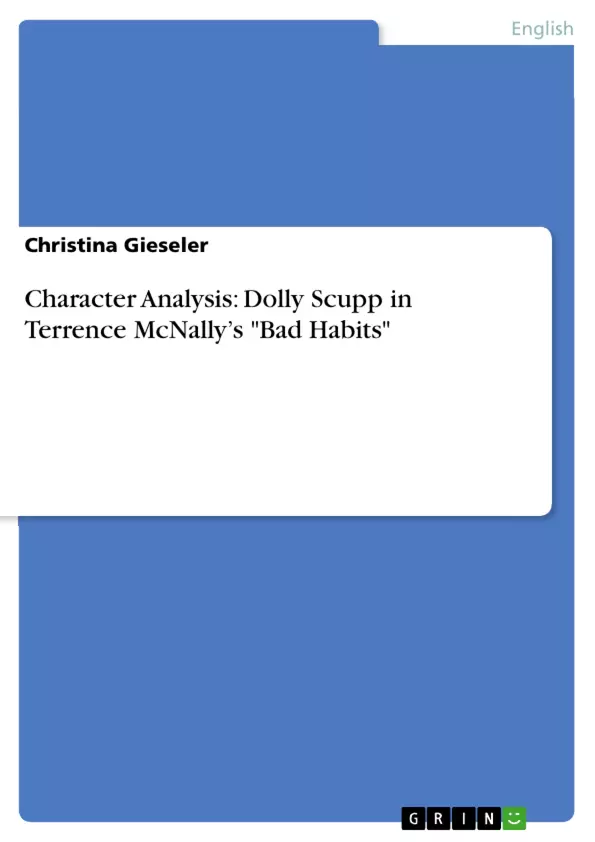My monologue is taken from Bad Habits by Terrence McNally and appears on page 19 (1; 2).I’m Dolly Scupp, my nationality is American and right now I’m in Ravenswood, WV, USA at
some kind of mental health center to visit my husband; our home is actually in Larchmont,WV (3; 4). I’m 50 years old and have been married to my husband Harry Scupp for a long time (5). I feel like he does not give me the attention I deserve, and that he thinks I’m unattractive because he has got a round and mean-looking tropical fish he calls after me (5;6)! So, I sometimes feel old, fat and frustrated (5; 6). I’m desperate and kind of exhausted,because I wish my marriage has been different – I just don’t know what to do and how this all came about (25).
About this fat fish thing I must say that am not a slender person, but hey, I’m not twenty anymore and actually, I think I’m a quite good-looking mature woman, and recently lost some weight (6)! Harry just doesn’t notice...
Inhaltsverzeichnis (Table of Contents)
- Character Analysis: Dolly Scupp in Terrence McNally's Bad Habits
Zielsetzung und Themenschwerpunkte (Objectives and Key Themes)
The objective of this character analysis is to provide a detailed examination of Dolly Scupp, a character from Terrence McNally's Bad Habits. The analysis explores Dolly's personality, motivations, and relationships, focusing on her emotional state and her troubled marriage.
- Marital Conflict and Communication Breakdown
- Repressed Anger and Emotional Expression
- The Impact of Societal Expectations on Women
- Identity and Self-Perception in Midlife
- Hope for Reconciliation and Change
Zusammenfassung der Kapitel (Chapter Summaries)
Character Analysis: Dolly Scupp in Terrence McNally's Bad Habits: This character analysis delves into the complex personality of Dolly Scupp, a 50-year-old woman grappling with a tumultuous marriage and repressed anger. The analysis uses Dolly's monologue to explore her feelings of neglect, frustration, and desperation stemming from her husband Harry's obsessive need for order and control. Dolly's suppressed anger manifests in impulsive actions, highlighted by the anecdote of running over Harry with a golf cart. The analysis contrasts Dolly's self-perception as a good-looking mature woman with Harry's apparent lack of appreciation, emphasizing the disconnect in their relationship. The chapter further explores Dolly's background, her upper-middle-class upbringing, and her life as a housewife, revealing the societal pressures and expectations that have shaped her identity and her current emotional state. The analysis highlights Dolly's lingering hope for reconciliation and positive change in her marriage, as evidenced by her decision to seek help from Dr. Pepper, their psychiatrist. The monologue itself acts as a cathartic release for Dolly, allowing her to express her pent-up emotions and confront the challenges within her marriage.
Schlüsselwörter (Keywords)
Marital conflict, repressed anger, emotional expression, midlife crisis, societal expectations, gender roles, communication breakdown, character analysis, Bad Habits, Terrence McNally.
Frequently Asked Questions: Character Analysis of Dolly Scupp in Terrence McNally's *Bad Habits*
What is the purpose of this character analysis?
This analysis provides a detailed examination of Dolly Scupp, a character from Terrence McNally's play, *Bad Habits*. It explores her personality, motivations, relationships, emotional state, and her troubled marriage.
What are the key themes explored in the analysis?
The analysis focuses on several key themes, including marital conflict and communication breakdown, repressed anger and emotional expression, the impact of societal expectations on women, identity and self-perception in midlife, and the hope for reconciliation and change within the marriage.
What is the main focus of the chapter summarizing the character analysis?
The chapter delves into Dolly Scupp's complex personality as a 50-year-old woman struggling with a tumultuous marriage and repressed anger. It uses Dolly's monologue to explore her feelings of neglect, frustration, and desperation caused by her husband's controlling nature. The analysis contrasts her self-perception with her husband's apparent lack of appreciation, highlighting the disconnect in their relationship. It also explores her background, societal pressures, and her lingering hope for reconciliation.
How does Dolly's suppressed anger manifest itself?
Dolly's suppressed anger manifests in impulsive actions, such as the anecdote of running over her husband with a golf cart. This serves as a dramatic illustration of her pent-up frustration and emotional turmoil.
What role does Dolly's background play in the analysis?
The analysis explores Dolly's upper-middle-class upbringing and life as a housewife, revealing the societal pressures and expectations that have shaped her identity and contributed to her current emotional state.
What is the significance of Dolly's monologue?
Dolly's monologue acts as a cathartic release, allowing her to express her pent-up emotions and confront the challenges within her marriage. It provides crucial insight into her inner thoughts and feelings.
What is the overall outlook regarding Dolly's situation and her future?
The analysis highlights Dolly's lingering hope for reconciliation and positive change in her marriage, as evidenced by her decision to seek help from a psychiatrist. This suggests a potential for growth and healing within the relationship.
What are the keywords associated with this character analysis?
Key words include marital conflict, repressed anger, emotional expression, midlife crisis, societal expectations, gender roles, communication breakdown, character analysis, *Bad Habits*, and Terrence McNally.
- Arbeit zitieren
- Christina Gieseler (Autor:in), 2007, Character Analysis: Dolly Scupp in Terrence McNally’s "Bad Habits", München, GRIN Verlag, https://www.grin.com/document/148693



